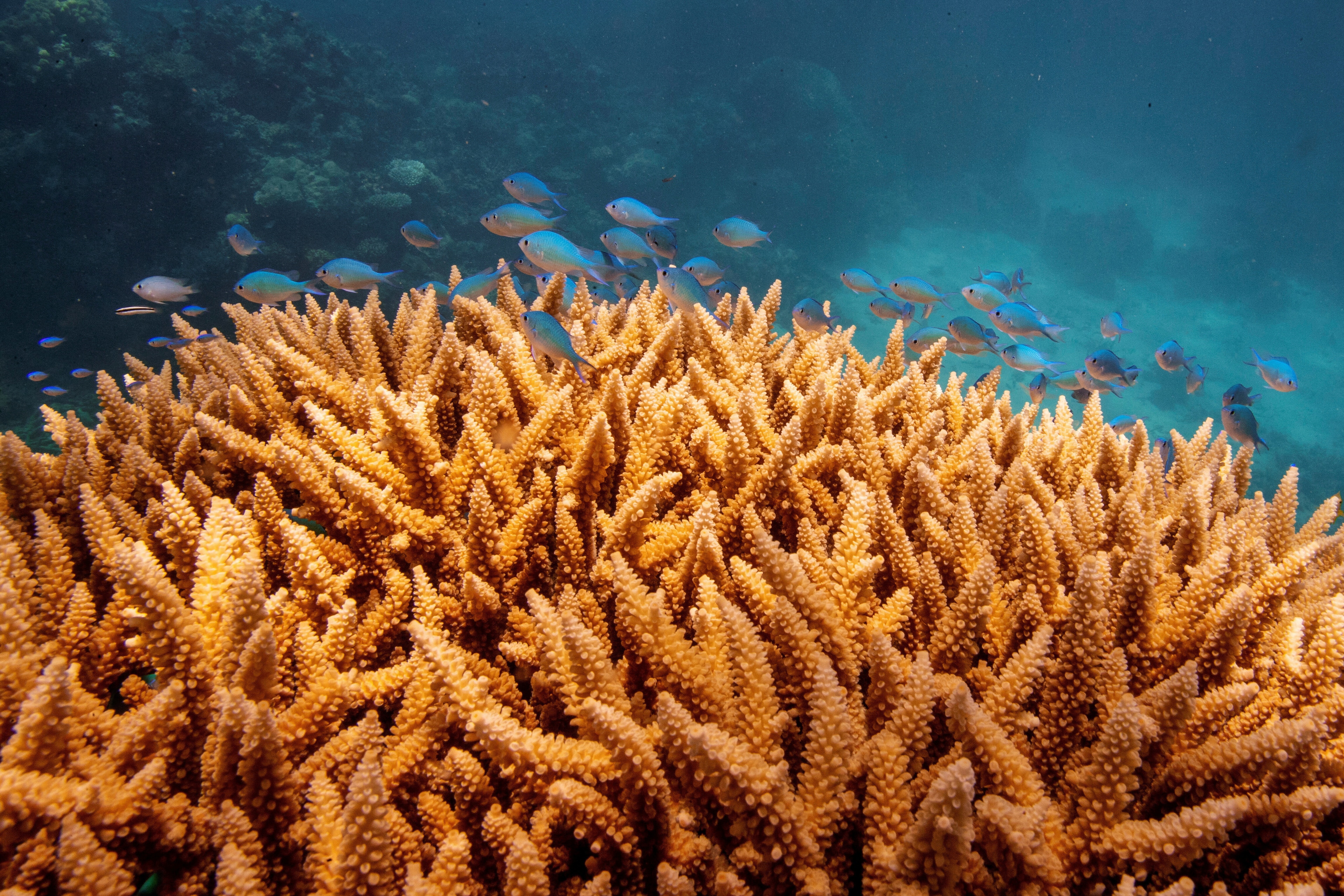How the Great White Shark's genes may help to fight cancer

By decoding the shark's genome, scientists hope to glean new insight into the mechanisms behind these healing powers.
Image: REUTERS
Stay up to date:
Healthcare Delivery
- Scientists have successfully sequenced the entire genome of the great white shark.
- Sharks have swum in the planet's oceans for the last 400 million years. Some experts believe their species-wide longevity stems from a resistance to diseases like cancer and ability to heal quickly.
- By decoding the shark's genome, scientists hope to glean new insight into the mechanisms behind these healing powers.
- There's even a possibility that the findings could help humans tackle disease in new ways.
Damage-resistant genes. Healing powers. Very low risk of cancer. No, scientists aren't describing Wolverine or Superman — those are the powers of the great white shark.
The star of Steven Spielberg's blockbuster, whose scientific name is Carcharodon carcharias, has a reputation as a meat-eating monster of the sea. But in fact, great white sharks may offer clues about the genetic underpinnings of self-repairing DNA.
For the first time, scientists have successfully sequenced the entire genome of the great white shark. A genome is all of an organism's genetic material — its genes and DNA. These sharks have 4.63 billion rungs on their DNA ladder, and 41 pairs of chromosomes compared to humans' 23, a new study revealed.
So this sequencing effort was years in the making.
But scientists think the work will be worth it, as Mahmood Shivji, a biologist at Nova Southeastern University and a co-author of the new study about the shark genome, told Business Insider.
"Sharks are well known to be able to heal from wounds efficiently, but nobody knows why," he said.
This new genome could reveal a plethora of genetic secrets that could explain why these animals are so good at healing and fending off disease.
"There's a tremendous amount to be learned from these highly successfully evolutionary marvels," Shivji said. "Their function and design is 400 million years of extremely fine-tuned evolution."
Great white sharks are quick healers
Great whites and other sharks appear to be able to recover from severe wounds — injuries that could come from risky courtship behaviors, fights with other sharks, or harpoon hunting— in just weeks.
Shivji and his co-authors found that the great white has more genes devoted to blood clotting, along with various proteins that help kick-start new skin and tissue, than any other mammal, fish, or bird.
"They've devoted a significant proportion of their genome to wound healing," Michael Stanhope, an evolutionary biologist at Cornell University who co-led the study with Shivji, told Wired.
In addition to this rapid healing, sharks don't get cancer more often than humans, despite their large size. Scientists generally think the chance of developing cancer should go up with an organism's body size and life span, since having more cells and a longer life leads to more opportunities for cancer-causing DNA damage to accumulate.
But "it is rare to find a 'sick' shark in the wild," scientists from the Mote Marine Laboratory wrote in a 2018 study.
Great whites can be up to 20 feet long, weigh some 7,000 pounds, and live between 40 and 70 years, so the fact that they don't have an increased risk of cancer suggests that something in their genome confers additional protection. (Sharks' typical causes of death involve interactions with humans or simply old age.)
One reason for that, according to the new study, may be that the great white's genetic code hides a balance of DNA opposites that make the overall genome stable.
On one hand, the genome has a large proportion of "jumping genes": genes that make copies of themselves then insert themselves into various parts of the genome. Shivji said scientists would expect these genes to make the genome more unstable because they break up DNA strands upon insertion, which raises the risk of errors and damage in the genetic code.
Such genomic instability is associated with higher risk of cancers in humans, as well as other age-related illnesses like Alzheimer's.
But it turns out that the shark genome balances these jumping genes with stabilizing genes involved in DNA repair, damage response, and damage tolerance.

So it appears that great white sharks have developed a way to keep their genomes stable despite their large bodies and long lifespans, Shivji said.
Sharks' genetic 'superpowers' could have applications for human health
While the idea that sharks are cancer-proof continues to circulate, the animals can get the disease. There have been 44 reported instances of cancerous lesions among 21 different types of chondrichthyes, a species class that contains sharks and sting rays. Of those 44 reports, about a third were malignant, according to a 2016 study.
That cancer myth is the basis for shark-cartilage pills, the sale of which continues to decimate shark populations worldwide. Great whites are now listed as "vulnerable to extinction" by the International Union for the Conservation of Nature.
Shivji emphasized that eating shark products — like taking the cartilage pills or consuming shark fin soup— won't improve your own genes' abilities to resist cancer.
"We want to avoid giving the impression to people that if you eat sharks, it'll cure diseases," Shivji said. "That's as silly as saying, 'if you eat sharks you'll be able to hold your breath better.'"
But he added that the shark genome could give scientists "information that could be useful for human biomedical applications," including ways to "fight cancer and age-related diseases, and improve wound healing treatments."
Any treatments developed based on these findings are still far off, though — Stanhope told Wired that "it will take years of work."
"Sharks have had over 400 million years to battle test their immune systems and develop this incredible capability," Shivji said. "We've only scratched the very surface of understanding how they do this."
Don't miss any update on this topic
Create a free account and access your personalized content collection with our latest publications and analyses.
License and Republishing
World Economic Forum articles may be republished in accordance with the Creative Commons Attribution-NonCommercial-NoDerivatives 4.0 International Public License, and in accordance with our Terms of Use.
The views expressed in this article are those of the author alone and not the World Economic Forum.
Related topics:
Forum Stories newsletter
Bringing you weekly curated insights and analysis on the global issues that matter.
More on Nature and BiodiversitySee all
Tom Crowfoot
August 14, 2025
James Balzer
August 14, 2025
Tom Crowfoot
August 12, 2025
Pedro Gomez and Clemence Schmid
August 6, 2025
Tom Crowfoot
August 5, 2025





